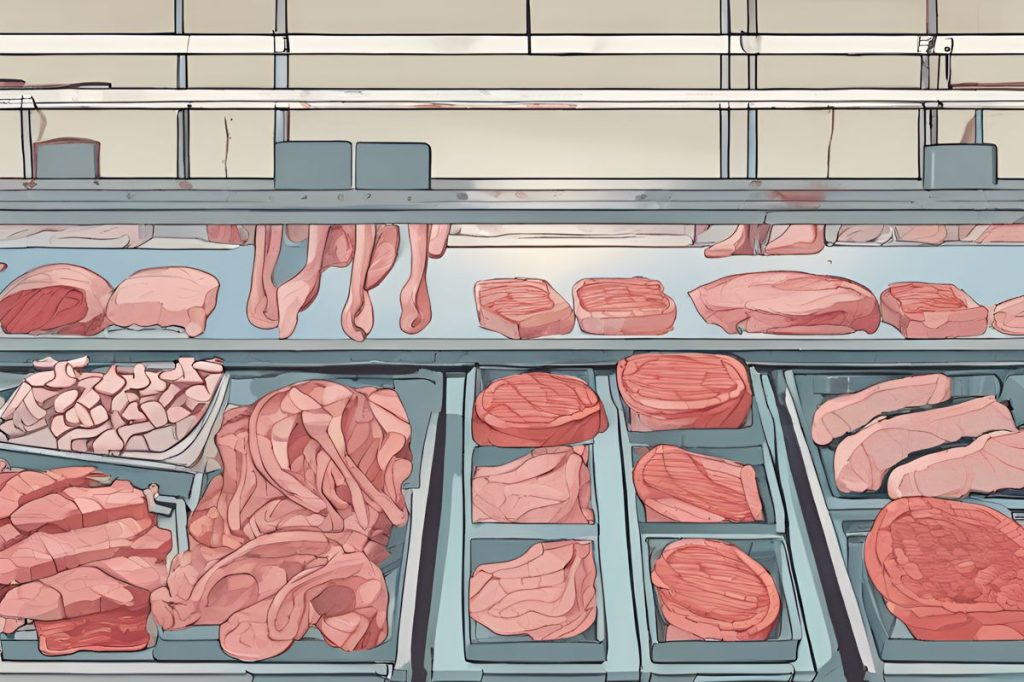Authorities confiscated 800 kg of meat products ahead of Easter due to labeling discrepancies, not health concerns, in routine inspections to uphold market standards and consumer trust in Cyprus. The seizure aimed to prevent illegitimate market practices and stabilize prices, with lamb and kid meat seeing a 10% increase while chicken prices dropped by 3-4%.
Why did authorities confiscate 800 kg of meat ahead of Easter?
Authorities confiscated 800 kg of meat products due to labeling discrepancies, not health hazards, as part of routine pre-Easter inspections to ensure market standards, uphold fair practices, and maintain consumer trust in the food industry. The seizure aimed to prevent illegitimate market practices and stabilize market prices.
Routine Inspections Lead to Seizure
In a proactive measure to uphold market standards, authorities have recently confiscated a large quantity of meat products totaling 800 kg. Agriculture Minister Maria Panayiotou, addressing the media, underlined that these actions were part of customary inspections ramping up for the Easter season. The seized meat, which was collected from various points within the production and supply chain, was not found to be health hazards but instead was impounded due to discrepancies in labeling.
The Minister pointed out that the primary concern was illegitimate market practices. Interestingly, this sweep did not flag any issues related to fruits and vegetables, indicating a possible compliance to regulations in that sector. These inspections are particularly significant as they help maintain consumer trust and ensure fair practice across the food industry.
Market Stability and Pricing
In light of the Easter celebrations, a time when traditional dishes take center stage in Cyprus, the availability of core ingredients like lamb and kid meat was a concern. Yet, Panayiotou assured that there was no shortage, as the market held adequate supplies to meet the demand. On the topic of pricing, there seemed to be a mixed bag. While some meat products witnessed a price drop in supermarkets, the head of the butchers association, Costas Livadiotis, indicated an uptick in prices compared to the previous year.
Livadiotis noted a 10% increase in the cost of lamb and kid meat and a slight rise of about 2% for pork. Chicken, on the contrary, saw a decrease in price by approximately 3-4%. He highlighted that these figures were reflective of prices without VAT, drawing attention to the government’s attempt to alleviate the high cost of living by implementing zero VAT on meat and vegetables. He also speculated that the seized meat likely originated from unlicensed farming units, though he mentioned that the quantity was relatively small compared to the whopping 800,000 kg typically consumed during Easter.
The Impact of Regulations
Enforcing regulations around food safety and market practices is crucial for protecting consumers and ensuring fair competition among producers and distributors. The government’s vigilance through routine checks is essential, especially during high-demand periods like the Easter holidays. Such interventions not only prevent the sale of potentially mislabeled or substandard products but also help in stabilizing the market prices by curbing illegal activities that can lead to price hikes.
Moreover, the government’s zero VAT policy on meat and vegetables is a testament to efforts in making essential commodities more affordable. This fiscal approach aligns with broader initiatives to support consumers during festive seasons and beyond, ensuring that the economic burden on citizens is mitigated.
Looking Forward
The confiscation of meat products serves as a reminder for vendors and producers to adhere strictly to regulations. It is through such enforcement that consumer rights are safeguarded, and trust in the food supply chain is strengthened. As the authorities continue with their diligent inspections, consumers can rest assured that measures are in place to protect their interests and maintain the integrity of the market, especially during significant cultural and religious events.
Why did authorities confiscate 800 kg of meat ahead of Easter?
Authorities confiscated 800 kg of meat products due to labeling discrepancies, not health hazards, as part of routine pre-Easter inspections to ensure market standards, uphold fair practices, and maintain consumer trust in the food industry. The seizure aimed to prevent illegitimate market practices and stabilize market prices.
What was the primary concern behind the recent meat confiscation in Cyprus?
The primary concern behind the recent meat confiscation in Cyprus was illegitimate market practices. The confiscated meat products were impounded due to discrepancies in labeling, highlighting the importance of adhering to regulations to maintain consumer trust and ensure fair practices in the food industry.
How did the market prices of different meat products change ahead of Easter in Cyprus?
Ahead of Easter, the market prices of meat products in Cyprus saw fluctuations. Lamb and kid meat experienced a 10% increase in price, pork saw a slight rise of about 2%, and chicken prices dropped by approximately 3-4%. These changes were influenced by factors such as supply, demand, and government policies like zero VAT on meat and vegetables.
What is the significance of routine inspections and enforcement of regulations in the food industry?
Routine inspections and enforcement of regulations in the food industry are crucial for safeguarding consumer rights, ensuring fair competition among producers and distributors, and maintaining market integrity. By conducting thorough checks and taking proactive measures, authorities can prevent the sale of mislabeled or substandard products, stabilize market prices, and protect consumers during festive seasons and beyond.

